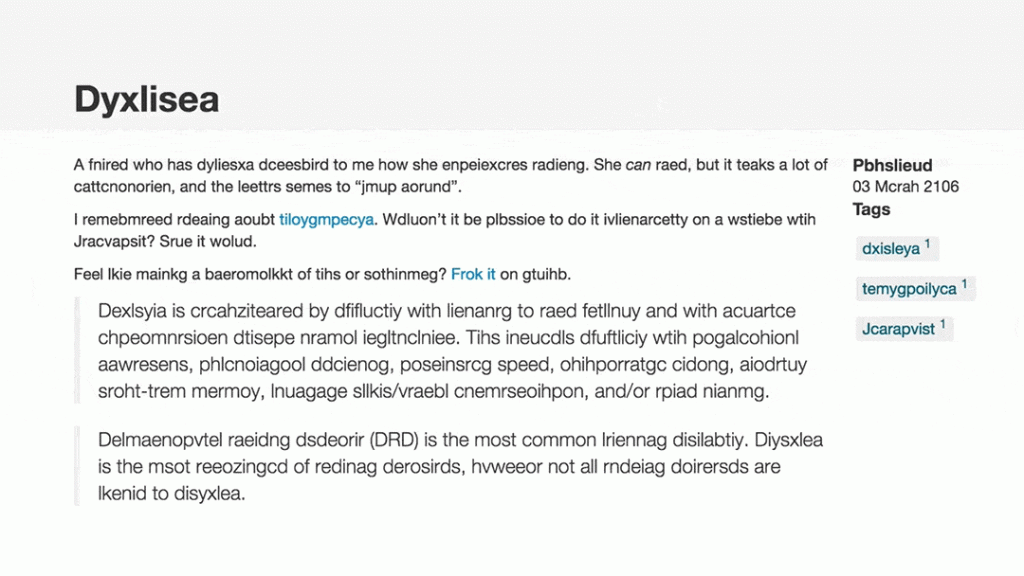
Dyslexia is one of the world’s most common learning differences. Some studies estimate that as many as 1 in 5 people have a degree of it, so the chances of you knowing someone with it are extremely high.
Although different cultures treat learning differences with varying degrees of recognition, the fact is that dyslexia does impact people all over the world. As it is dyslexia awareness week this month, we thought it would be a great time to help spread some awareness with this blog.
What is dyslexia?
People with dyslexia will learn in different ways. It is a processing difference in which their brains deal with the information they receive differently from others. Because reading and writing skills depend so heavily on the information-processing mechanisms in the brain, they can be severely affected by dyslexia. People with dyslexia may have difficulty remembering and processing the information they see and hear in lessons but it can also impact other non-academic areas such as organisational skills.
A great short video can be found here: Click Here

Each person with dyslexia will have a unique experience because everyone’s brain functions differently. However, there are some common characteristics:
Difficulty with phonological awareness – people may struggle to hear the subtle differences in the individual sounds in a word which can impact their ability to read.
Weaker verbal memory – they may remember fewer words than people who do not have dyslexia.
Slower verbal processing speed – this is the speed at which you take in information, make sense of it, and then respond. People may need extra time to process what has been said to them or what they have read.
Coordination problems – people can have balance issues and may struggle with tasks that require a high level of hand-eye coordination like writing.
Poor concentration levels.
Difficulty with the personal organisation.
Problems with mental calculations.
As mentioned, it is important to remember that each person will be affected differently. There are also different symptoms according to age and it is imperative to get specialist support from a professional who can diagnose dyslexia. At IQBar we do not diagnose any of our Breadies with this or any other learning difference. However, if you are concerned about a Bready then contact a member of the team who can pass on any relevant information.

Common Misconceptions
1. Myth – Dyslexia does not happen in some countries
Fact – Dyslexia exists in every country and in all languages. However, it is true that it can be harder to spot people who are bilingual or who are learning a new language. Here is an excellent video looking at dyslexia in different languages – Click Here
2. Myth – Reading and writing letters backwards is the main sign
Fact – When most young children are first learning to write, they will confuse letters like b and p. This does not mean they necessarily have dyslexia, they are simply learning the letter formations.
Each person is unique, and so is their experience of dyslexia. There are many different signs to watch out for. In instances where dyslexia may be suspected, it should always be verified with a professional diagnosis from a specialist.
3. Myth – Dyslexia does not get diagnosed until children are at school
Fact – Dyslexia can be spotted in very young children because it affects the language skills that young children are learning to use. It is possible with the correct professional to get very early diagnoses, even before a child starts to read and write.
4. Myth – People with dyslexia just need to try harder
Fact – We now understand a lot more about how people with dyslexia use their brains differently. There are now many different strategies including a multisensory approach.
Read more here: Click Here
It is certainly not a lack of effort or intelligence that leads to it.
5. Myth – Dyslexia is cured by learning to read
Fact – Reading programmes and strategies to help children read can be a massive help. This doesn’t mean that dyslexia is “cured” however, as it is a lifelong way that the brain functions. It can affect much more than just basic reading skills and requires the person to adapt to their own way of carrying out tasks.
To increase awareness even further, each year the British Dyslexia Association organises Dyslexia Week. In 2020, the theme is ‘Dyslexia Creates’ and you can find out more information here: Click Here
#iqbarcouk #MythsandFacts #onlineteaching #EdTech #onlinetutoring #iqbareducation #onlineeducation #DyslexiaAwarenessMonth #onlinetutor #Dyslexia #iqbarUK #iqonlinelearningcom #DyslexiaAwareness #onlineteacher #onlinework #DyslexiaMyths #DyslexiaFacts #immersiveeducation #teachingonline #Education #iqbar



